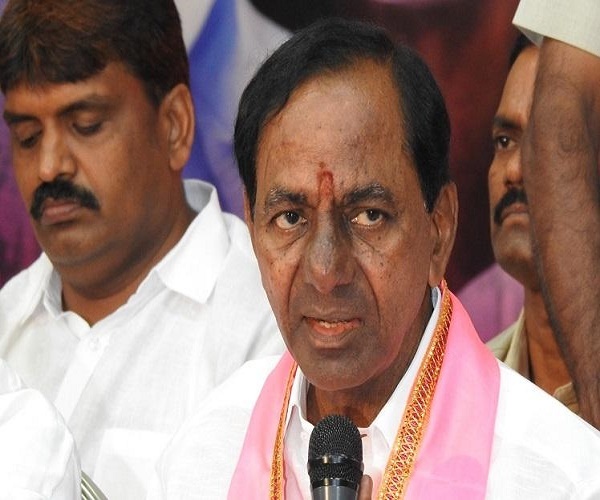Returning to power for a second consecutive term after routing the Congress-led Prajakutami and BJP in Telangana, TRS chief K Chandrasekhar Rao set his eyes on 2019. Reiterating his plan for a non-Congress, non-BJP front for the Lok Sabha Elections, the Telangana Chief Minister in waiting called for an economic and political overhaul in India.
“We can do things, we can undo things. This is the thinking of Congress and BJP. This is arrogance of both these national parties. Yes, that should be tackled. India first needs to tackle the arrogance of Congress and BJP. The headstrongness of these political parties has become enemy of this country – making all others slaves (sic),” said KCR while addressing the media on Tuesday.
KCR’s pitch, like that of many regional leaders, is an increase in state autonomy by weakening the concurrent list. He noted, “They (national parties) are saying that they will make the Concurrent List more powerful. They have no right. We need to weaken it. There should be no concurrent list. Dismiss it.”
Emphasising the need to decentralise power, KCR said, “There is a dire need. There is a serious need, there is a need for a surgery. Some fools may not agree. The illness will not go by medicines. There is need for a surgery.” He added, “How long will this kind of politics go on for? How long will it go on for? This needs to go.
How long will they fool people? The autonomy of states should increase. The Concurrent List should be weakened. There should be a clear division. Subjects which are under the Centre must be transferred to the state. This must be debated.”
KCR’s pitch for 2019 is, however, not new. But let’s begin with the basics.
What is the Concurrent List?
The Constitution of India has provided for a division of powers between the Central and state governments. Under the Seventh Schedule, there are three lists – the Union, State and Concurrent.
The Union List has a range of subjects under which the Parliament may make laws. This includes defence, foreign affairs, railways, banking, among others.
The State List lists subjects under which the legislature of a state may make laws. Public order, police, public health and sanitation; hospitals and dispensaries, betting and gambling are some of the subjects that come under the state.
The Concurrent List includes subjects that give powers to both the Centre and state governments. Subjects like Education including technical education, medical education and universities, population control and family planning, criminal law, prevention of cruelty to animals, protection of wildlife and animals, forests etc.
However, given that there can be conflict when it comes to laws passed by Parliament and state legislatures on the same subject, the Constitution provides for a central law to override a state law, points out PRS Legislative Research.
Since 1950, the Seventh Schedule of the Constitution has seen a number of amendments. The Union List and Concurrent List have grown while subjects under the State List have gradually reduced. The 42nd Amendment Act was perhaps one of the most controversial.
Effected in 1976 during the Emergency by then Prime Minister Indira Gandhi, the amendment restructured the Seventh Schedule ensuring that State List subjects like education, forest, protection of wild animals and birds, administration of justice, and weights and measurements were transferred to the Concurrent List.
Former Tamil Nadu Chief Minister CN Annadurai was one of the first to advocate for state autonomy and federalism at the Centre. “It will be sufficient if the Centre retains only such powers as are necessary for preserving the unity and integrity of the country, leaving adequate powers to the states,” he said in 1967.
Taking his idea forward, the Tamil Nadu government under M Karunanidhi constituted the PV Rajamannar Committee to look into Centre-State relations. While the Committee submitted its reports in 1971, the Tamil Nadu Legislative Assembly adopted a resolution three years later demanding that the Centre accept the state’s views on state autonomy and the recommendations of the Rajamannar Committee.
The Rajamannar Committee spurred other states to voice their opposition to the Centre’s encroachment on subjects that were historically under the state’s purview. In 1983, a meeting of the Chief Ministers of four southern states – Tamil Nadu, Puducherry, Karnataka and Andhra – was viewed with “trepidation in New Delhi”, states a report by India Today.
The 10-hour discussion revolved around the allocation of central revenue to states, and greater autonomy for states. The historic meeting was enough for then PM Indira Gandhi to constitute the Sarkaria Commission to look into Centre-State relations. However, the recommendations of the Sarkaria Commission were not implemented by successive central governments.
The Telangana CM is by no means the lone leader demanding greater state autonomy today. Remember the south Finance Ministers’ Conclave in April this year? Hosted by the Left-led Kerala government in Thiruvananthapuram, the meeting was to discuss the “unjust” Terms of Reference in the 15th Finance Commission – the body that determines how tax revenue collected by the Centre is distributed to the states. Significantly, Telangana was the only state that did not send its representative for that meeting.
Over the years, a number of regional parties have voiced their opposition to growing interference by the Centre. Issues like NEET, Right to Education Act, National Food Security Act among others have exacerbated the tussle between Centre and state.
So, while KCR may make overhauling Centre-state relations one of his main plans in the run-up to the 2019 Lok Sabha Elections, the question is, will other regional leaders rally behind him? #KhabarLive







